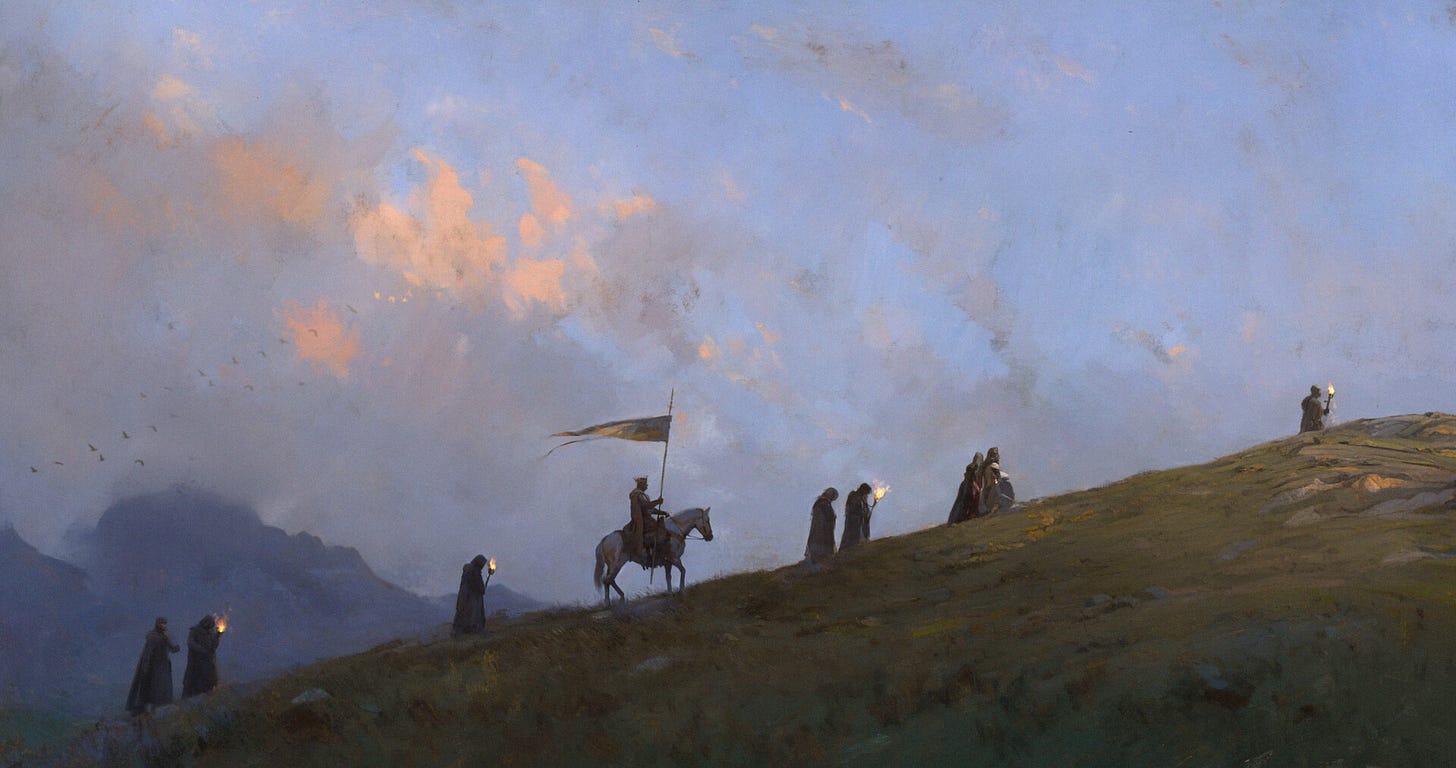The Price of Loyalty (The Year 509)
Salisbury welcomes a new Earl and Sir Arnold receives a new position. But his first mission is off to a bad start...
In the year 509, young Robert, son of Countess Ellen, was appointed the new Earl of Salisbury. With no king to preside over the ceremony, his mother led the investiture herself, joined by the newly appointed Marshal, Sir Hugh, The eldest son of the old Sir Elad. The knight had withdrawn already from public life the previous year, entrusting command of the Countess’s forces to his heir.
Shortly before Sir Robert’s investiture, Sir Arnold was summoned to the great hall. The earl’s household knights had been left leaderless since the death of Sir Cuhelyn, who had fallen in the battle the previous year. Robert, recalling Arnold’s act of heroism - saving his life from a Saxon ambush, wished to name him the head of his Household troops. Yet Arnold hesitated. The position, though honourable, was a step-down for a knight of his standing, one who held two manors. Robert pressed him further, promising that trusted stewards would oversee his lands. Also, Robert told him he did not consider him merely as a captain of his guard but also as his personal advisor, a mentor to guide him where his own military experience failed. And so Arnold accepted.
Out of character here. I realized the stewardship of both manors don’t interest me as much as having Arnold at the forefront of the events that will unfold the next years in the Boy King Period. So I want to place him close to Robert, without the everyday concerns of maintaining the manors.
His first mission came swiftly: to escort this year’s tribute destined for the Saxons. A convoy of heavy-laden wagons set forth from Sarum, bound for Du Plain Castle, where the Saxon emissaries would collect the tribute on the other side of the Test River.
A brash young knight, Sir Brandoc, who escorted the tribute seized one of the wagons as the group was resuppling. The Laverstocks gave chase. Weighed down with gold, it was not difficult to catch up with the stolen cart as they rushed into the Harewood. A group of shadowed riders emerged from the treeline. Their heavy cloaks and deep hoods obscured them, yet these were no common brigands. Heavy armed, they lowered their lances and charged.
Arnold was struck hard. Very hard. He was thrown from the saddle, immediately unconscious, blood rushing from underneath his armor, spoiling over his legs. Perin fought desperately to defend his fallen brother. The hooded knights, seeing the Laverstocks were in no state to pursue them, made off with the stolen tribute.
“Whose men were those?!” Perin spat, pressing his hands firmly on Arnold’s bleeding wounds. The faithful squire Gwinas worked swiftly to dress his master’s injuries. “Have they fled?,” Arnold — now regaining consciousness — asked through clenched teeth, rolling onto his side in frustration.
They pressed on to Du Plain, where Arnold was rushed to the castle’s chirurgin. His wounds were treated, but the healer’s verdict was grim: three months of bed rest would be needed for a full recovery. Yet Arnold, ever driven by duty, refused to yield. Despite his pain, he demanded to be brought before the Saxon emissaries. If he must deliver the meagre remains of the tribute, he would do so himself.
Swaddled in thick furs and laid upon a cart, Arnold was driven out to meet the waiting Saxons. They sneered at the sight of him—a grey-faced man, barely clinging to life. But their amusement turned to fury when they uncovered the tribute’s diminished contents.
“What is this, cripple?” they jeered. “you’re mocking us. This is not what was promised!” Arnold weakly recounted the theft.
Ceredic’s men scoffed. “Our prince expected as much. While your lands crumble, you waste your gold on feasts and your new earl. Our prince told so ourselves. Know this: if the full tribute is not delivered by year’s end, we shall come in the night and slaughter the young pup.”
The Laverstocks returned to Sarum and stood before Earl Robert.
“I have heard much the same from others,” Robert mused. “Discontented knights who haven’t received their share after last year’s battles. They now turn to plunder. Rumours speak of a company of well-trained bandits within Harewood. But who commands them remains unknown.”
Arnold straightened, wincing as the pain shot through him. “Let me redeem my failure. Grant me leave to hunt them down.”
Robert shook his head. “You are in no state to take up such a charge. Rest, so that you may serve when the time comes. The tournament approaches, and beyond that, the Saxons remain our greater threat.” He spoke, unshaken. “Surrounded by seasoned warriors, what have I to fear? What we lack is not strength, but a king to unite us—to lead us to the final victory over the saxons.”
Winter came, and with it, a marriage. Arnold was to wed the Lady Lynette, a daughter of his new steward. The match was no grand affair; it had been arranged by Earl Robert himself.
“A man who wishes to serve me,” the young earl had declared, “and one of your standing—must be wed.”
And so, though no banners flew nor songs were sung during that cold winters day, Arnold of Laverstock was wed, foolish threats and pretentious rivalry looming like a shadow over the newly-weds.




Winter seems to be really rough for the Laverstock's, yikes! I have heard only good things about Pendragon, and these write ups have made me want to check it out!